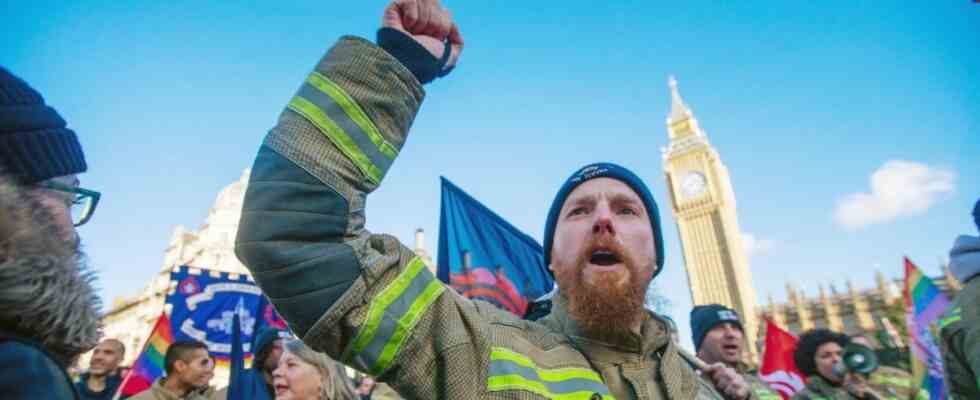If you look at the calendar, there is only one day in Great Britain before the end of the year on which no strikes are announced. On all other days people want to go into industrial action. There are border guards and bus drivers, nurses, postmen and firefighters, teachers and railway employees. They are all demanding higher wages because life is becoming more and more expensive, the inflation rate is already at a good eleven percent.
It looks like the UK is facing the biggest wave of strikes since 1989, when the country had a prime minister, Margaret Thatcher, who had little sympathy for workers’ concerns. Now a Conservative prime minister is back in power at 10 Downing Street, and if you’re not mistaken, Rishi Sunak is trying to emulate the Iron Lady. In any case, this week in parliament he threatened to restrict the right to strike if the trade unions continued to behave “unreasonably”. The government is working on “new, tough laws to protect people from these disorders,” Sunak said.
The government is working on contingency plans
The prime minister understands “disruptions” to mean the effects of strikes, which have been going on for months in the post and rail sector. The servants are demanding significantly higher wages – in line with inflation. But neither the railways nor the Royal Mail has so far reached an agreement. Only recently, for example, the railway union RMT rejected an offer from employers that provided for four percent more wages for two years. It called its members to two 48-hour strikes for the coming week and also announced a longer walkout over the Christmas period.
Mick Lynch, the general secretary of the RMT union, told the BBC belligerent but also a little contrite: “We don’t want that to happen over Christmas.” However, the union has no choice. It is still hoped that the employers will come up with a better offer and that the strike can be called off, Lynch said. However, he doesn’t seem to have much hope.
The call for higher wages is also loud in Scotland: members of the teachers’ union Educational Institute of Scotland in Edinburgh.
(Photo: Russell Cheyne/Reuters)
The railway employees are not alone in their demands. On December 15th and 20th, workers at the chronically underfunded National Health Service (NHS) plan to strike for higher wages for the first time. The ambulance drivers have also announced that they will stop working around Christmas. The government is working on contingency plans to at least get some of the effects under control. If the Ministry of Health has its way, soldiers should be used to drive ambulances.
The British army should not only help in the health sector. The Ministry of Defense has already complied with a request from the Ministry of the Interior to cushion another imminent wave of strikes: 600 soldiers will support the Border Force because border guards also want to stop work on several days between Christmas and New Year. At several airports, there should therefore be longer queues when entering Great Britain. So that they don’t get too long, could be loud Times even a third of all flights will be canceled on the affected days.
Traveling during the Christmas season can be difficult
In any case, the PCS union announced that border guards would go on strike at London’s Heathrow and Gatwick airports, as well as at Manchester, Birmingham and Cardiff airports. There are around 1,000 employees who are responsible for passport controls. According to PCS General Secretary Mark Serwotka, the government is only offering a two percent increase in wages. He was rather disappointed with the Interior Ministry’s negotiators: “They say their door is open, but it’s a very strange door because there’s nothing behind it.” The only thing that is certain so far is that if no agreement is reached, many people will have to change their travel plans around Christmas.
The public’s understanding of the wave of strikes differs depending on the sector. According to polls by the polling institute YouGov, the majority of Britons support the strikes by nurses, teachers and firefighters. On the other hand, the fact that doctors and police officers are going to stop work meets with far less approval.
In the political arena in Westminster, Prime Minister Sunak has had to put up with criticism from the Labor Party in particular. Its deputy chairwoman Angela Rayner accused the government of not taking care of workers’ real wage losses: “This is a militant government that doesn’t deal with these issues and doesn’t solve the causes of the strikes, and that’s frustrating.”
While Labor tries to anger for the working class To blame the government, Prime Minister Sunak faces a very practical problem. After he ordered the country to implement strict austerity measures right at the beginning of his term in office, there simply isn’t the money to significantly increase the wages of nurses in the NHS health service, for example. In any case, Westminster says the treasury is as good as empty.

